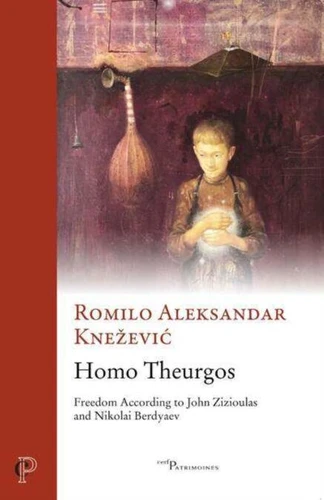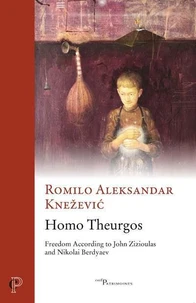Homo theurgos - freedom according to john zizioulas and nikolai berdyaev
Par :Formats :
Disponible dans votre compte client Decitre ou Furet du Nord dès validation de votre commande. Le format ePub protégé est :
- Compatible avec une lecture sur My Vivlio (smartphone, tablette, ordinateur)
- Compatible avec une lecture sur liseuses Vivlio
- Pour les liseuses autres que Vivlio, vous devez utiliser le logiciel Adobe Digital Edition. Non compatible avec la lecture sur les liseuses Kindle, Remarkable et Sony
- Non compatible avec un achat hors France métropolitaine
 , qui est-ce ?
, qui est-ce ?Notre partenaire de plateforme de lecture numérique où vous retrouverez l'ensemble de vos ebooks gratuitement
Pour en savoir plus sur nos ebooks, consultez notre aide en ligne ici
- Nombre de pages303
- FormatePub
- ISBN978-2-204-13719-5
- EAN9782204137195
- Date de parution02/04/2020
- Protection num.Adobe DRM
- Taille3 Mo
- Infos supplémentairesepub
- ÉditeurÉditions du Cerf
Résumé
In the religious epoch of law and redemption the moral side of human nature prevailed and outweighed the aesthetic and cognitive side, argued Nikolai Berdyaev, the renowned Russian religious philosopher. The Christianity of law and redemption identified religious with the moral. However, asked Berdyaev, can the goal of sanctifi cation be reached by religious-aesthetic or religious-cognitive perfection? Can God refuse a person for his ugliness and want of knowledge if the person is morally perfect? Can the person be refused because he does not create beauty or knowledge? Can a man be saved by great accomplishments in beauty and knowledge? For our eternal life, does God require only the moral person, or also the aesthete and the knower? But behind these questions there is a more fundamental dilemma: does God need the human person? Because if he does not then even the highest expressions of the human spirit count for little for him who is omnipotent and omniscient.
The classical concept of the omnipotent deity allows only for one religious human activity, and that is the prayer for redemption. But if not even the best what we can create is good enough to exist in eternity, what is it that is "saved" from human nature?Romilo Aleksandar Knezevic is Research Fellow at the Orthodox Th eology Faculty, University of Belgrade. In the present book, his enlarged doctorate from Oxford University, he argues for a new type of ontology and ontological freedom: out of the bottomless, uncreated abyss of freedom, God creates human being capable of amplifying His life.
The classical concept of the omnipotent deity allows only for one religious human activity, and that is the prayer for redemption. But if not even the best what we can create is good enough to exist in eternity, what is it that is "saved" from human nature?Romilo Aleksandar Knezevic is Research Fellow at the Orthodox Th eology Faculty, University of Belgrade. In the present book, his enlarged doctorate from Oxford University, he argues for a new type of ontology and ontological freedom: out of the bottomless, uncreated abyss of freedom, God creates human being capable of amplifying His life.
In the religious epoch of law and redemption the moral side of human nature prevailed and outweighed the aesthetic and cognitive side, argued Nikolai Berdyaev, the renowned Russian religious philosopher. The Christianity of law and redemption identified religious with the moral. However, asked Berdyaev, can the goal of sanctifi cation be reached by religious-aesthetic or religious-cognitive perfection? Can God refuse a person for his ugliness and want of knowledge if the person is morally perfect? Can the person be refused because he does not create beauty or knowledge? Can a man be saved by great accomplishments in beauty and knowledge? For our eternal life, does God require only the moral person, or also the aesthete and the knower? But behind these questions there is a more fundamental dilemma: does God need the human person? Because if he does not then even the highest expressions of the human spirit count for little for him who is omnipotent and omniscient.
The classical concept of the omnipotent deity allows only for one religious human activity, and that is the prayer for redemption. But if not even the best what we can create is good enough to exist in eternity, what is it that is "saved" from human nature?Romilo Aleksandar Knezevic is Research Fellow at the Orthodox Th eology Faculty, University of Belgrade. In the present book, his enlarged doctorate from Oxford University, he argues for a new type of ontology and ontological freedom: out of the bottomless, uncreated abyss of freedom, God creates human being capable of amplifying His life.
The classical concept of the omnipotent deity allows only for one religious human activity, and that is the prayer for redemption. But if not even the best what we can create is good enough to exist in eternity, what is it that is "saved" from human nature?Romilo Aleksandar Knezevic is Research Fellow at the Orthodox Th eology Faculty, University of Belgrade. In the present book, his enlarged doctorate from Oxford University, he argues for a new type of ontology and ontological freedom: out of the bottomless, uncreated abyss of freedom, God creates human being capable of amplifying His life.




